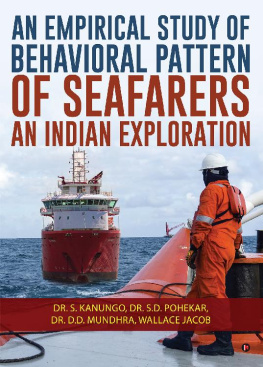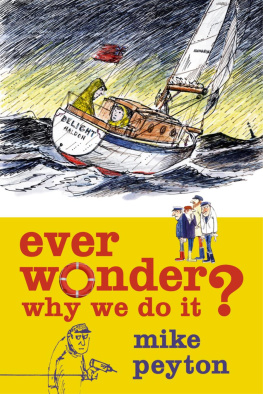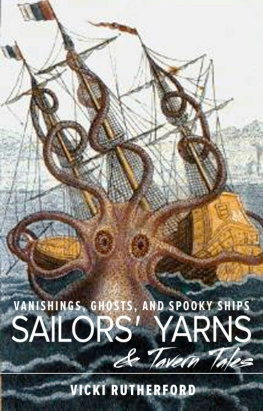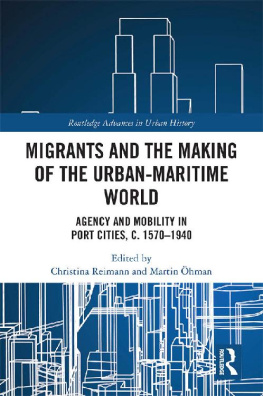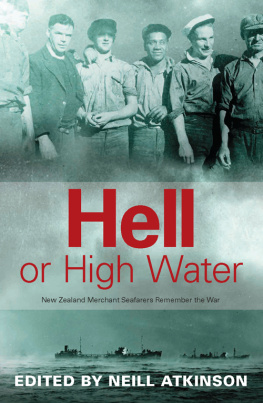Notion Press
Old No. 38, New No. 6
McNichols Road, Chetpet
Chennai - 600 031
First Published by Notion Press 2018
Copyright Dr. S. Kanungo, Dr. S.D. Pohekar, Dr. D.D. Mundhra, Wallace Jacob 2018
All Rights Reserved.
eISBN 978-1-64249-165-4
This book has been published with all reasonable efforts taken to make the material error-free after the consent of the author. No part of this book shall be used, reproduced in any manner whatsoever without written permission from the author, except in the case of brief quotations embodied in critical articles and reviews.
The Author of this book is solely responsible and liable for its content including but not limited to the views, representations, descriptions, statements, information, opinions and references [Content]. The Content of this book shall not constitute or be construed or deemed to reflect the opinion or expression of the Publisher or Editor. Neither the Publisher nor Editor endorse or approve the Content of this book or guarantee the reliability, accuracy or completeness of the Content published herein and do not make any representations or warranties of any kind, express or implied, including but not limited to the implied warranties of merchantability, fitness for a particular purpose. The Publisher and Editor shall not be liable whatsoever for any errors, omissions, whether such errors or omissions result from negligence, accident, or any other cause or claims for loss or damages of any kind, including without limitation, indirect or consequential loss or damage arising out of use, inability to use, or about the reliability, accuracy or sufficiency of the information contained in this book.
Contents
ACKNOWLEDGMENTS
The authors of this book express their sincere gratitude to:
Late Dr. N.P. Tolani sir, Founder, Tolani Maritime Institute,
Dr. (Mrs.) Sujata NaikTolani, Chairperson, Tolani Shipping Company Limited,
Capt. R.K. Razdan, Provost, Tolani Maritime Institute,
Dr. B.K. Saxena, Principal, Tolani Maritime Institute,
Mrs. Sheela Saxena, Tolani Maritime Institute,
Capt. Krishnamurthy Iyer, Program Chair Nautical Technology, Tolani Maritime Institute,
Mr. Vishwanath Mishra, Ebix Inc.,
Mr. Sadarat Khaldy and Mrs. Garima J. Khaldy, IBM Canada,
Dr. Blanche Barnes, Clinical Psychologist, Mumbai,
Dr. A.A. Rashid, Principal, Tolani College of Commerce,
Dr. Urvashi Rathore, Professor, Symbiosis Centre for Information Technology,
Mr. S.K. Srivastava, Sr. Associate Prof, Tolani Maritime Institute,
Mr. Sachin M. Vyavahare, Associate Prof, Tolani Maritime Institute,
Dr. Vinod Kumar Mangwani, Associate Prof, Tolani Maritime Institute,
Mr. Ganesh B. Ingle, Sr. Assistant Prof, Tolani Maritime Institute,
Mr. Mukesh J. Umbarkar, Lecturer, Tolani Maritime Institute,
Mrs. Sheetal Joshi, Sr. Administration Executive, Tolani Maritime Institute,
566 respondents to the questionnaire circulated by the authors of this book.
The initial questionnaire which was framed is given in Appendix I. A pilot study was carried out and after several revisions carried out by
(i) Dr. B.K. Saxena,
(ii) Mrs. S. Saxena,
(iii) Capt. I. Banerjee,
(iv) Capt. D. Sabharwal,
(v) Prof. (Dr.) R. Prasad,
(vi) Mr. S.K. Srivastava,
(vii) Mr. Upinderjeet Singh,
(viii) Dr. Urvashi Rathore,
the questionnaire took the final shape which is given in Appendix II. The book in your hand is an attempt to present pictorially the responses we received from 566 seasoned seafarers.
INTRODUCTION
Shipping is the life blood of the global economy. About 90% of the world trade is carried by the International Shipping Industry. The maritime industry is so diverse that it affects a majority of human beings in one way or the other. In the 2014 Maritime Summit, Efthimios Mitropoulos (seventh Secretary-General of the International Maritime Organization) explained the significance of shipping, pithily, when he said, Half of the world would starve and other half would freeze had it not been shipping. It may not be an exaggeration to say that shipping is a mother-industry which has given birth to several primary and ancillary industries. There are over 50,000 merchant ships trading internationally, transporting every kind of cargo. The world fleet is registered in over 150 nations, and manned by over a million seafarers of virtually every nationality. Indian seafarers account for only 6.7 per cent in the world maritime domain. Shipping has witnessed tremendous changes in the past hundred years or so. The speed of the ships has increased from roughly 12 knots to approximately 40 knots. The length of the ship has increased from roughly 300 feet to approximately 1,000 feet or more, and the carrying capacity of the ships has increased from roughly 10,000 tones to approximately 500,000 tons or more. Sextant and Morse code have given way to satellite technology and the work on ships as well as terminals is becoming more and more automated thus reducing crew/worker requirements. Nonetheless, the seafarers have to work under extremely difficult working conditions, far from home, for extended periods of time, and are subject to several occupational risks. With every passing year, new and newer regulations pertaining to vessel manning, crew training, vessel maintenance, vessel inspections, safety and pollution, insurance, communications and documentation are being added to the already existing ones. Needless to say that at times the changes are so rapid that it becomes extremely laborious to keep oneself abreast with the changes. New and newer findings emerge at every stage. For instance, on Jan 02, 2017, The Times of India , carried a news report on page 13 according to which a huge fire had already damaged the RMS Titanic before it hit the iceberg. The RMS Titanic may have sank due to an enormous fire on board and not by hitting an iceberg in the North Atlantic. According to researchers, the fire went unnoticed for three weeks leading up to the collision. Such new and newer findings (inferences) challenge our understanding of the industry, incidences and workers.
Ships require the services of sundry specialists such as pilots, tug operators, custom brokers, and surveyors. Like the ocean itself, the marine industry can be difficult to navigate. Perhaps no amount of exploration may be sufficient. Nonetheless, the authors have tried to explore the behavioral pattern of seafarers and project their findings.
According to the BIMCO and ICS reports the global supply of seafarers in 2015 was estimated at 1,647,500, seafarers, of which 774,000 are officers and 873,500 are ratings . The estimated five largest seafarer supply countries are:
For all Seafarers | For Officers | For Ratings |
| China | China | Philippines |
| Philippines | Philippines | China |
| Indonesia | India | Indonesia |
| Russian Federation | Indonesia | Russian Federation |
| Ukraine | Russian Federation | Ukraine |

